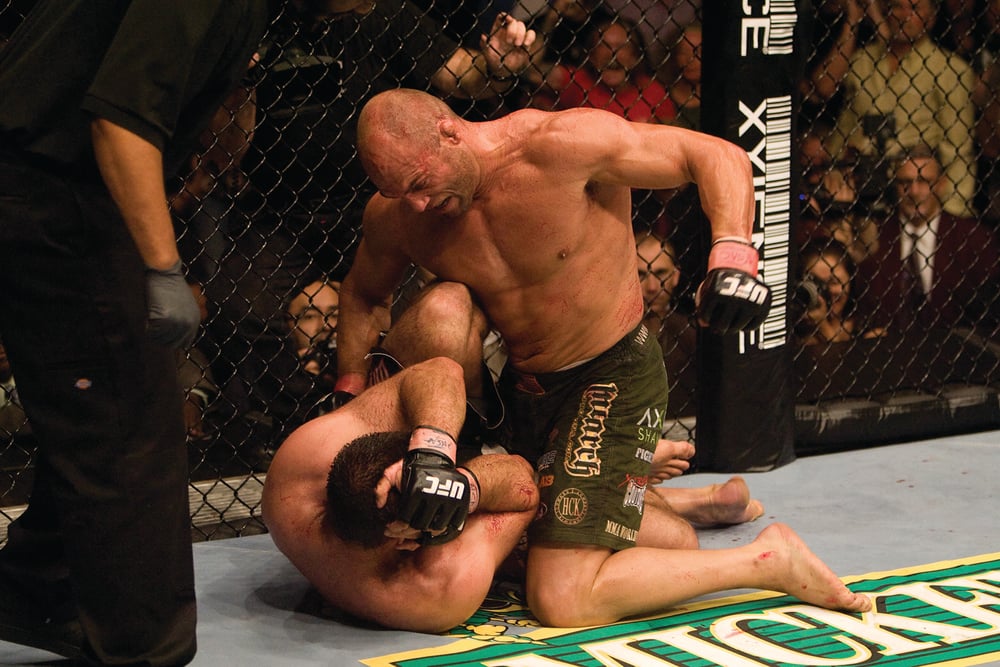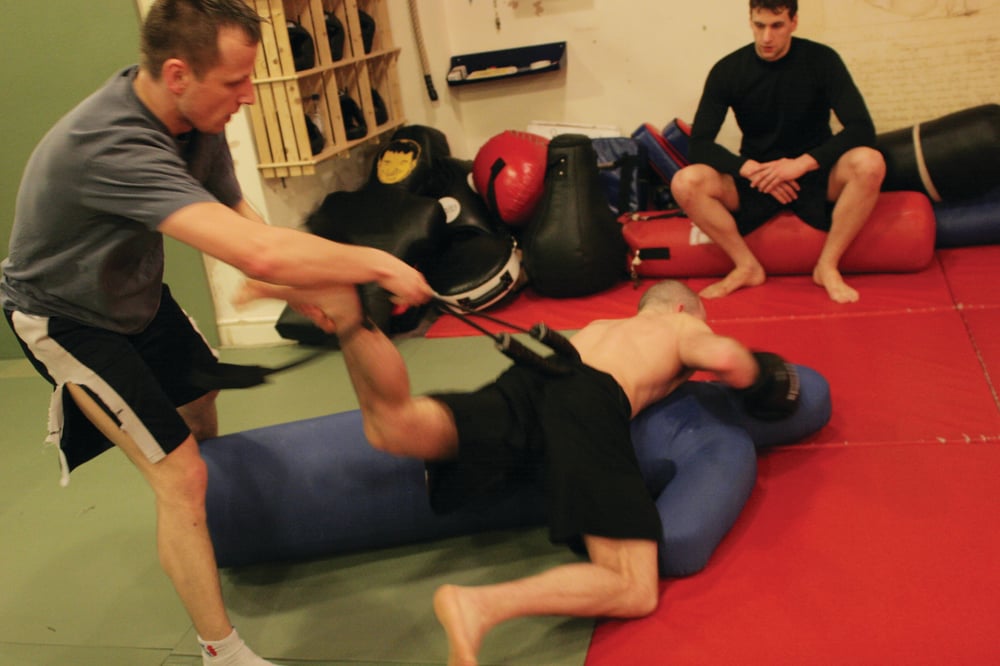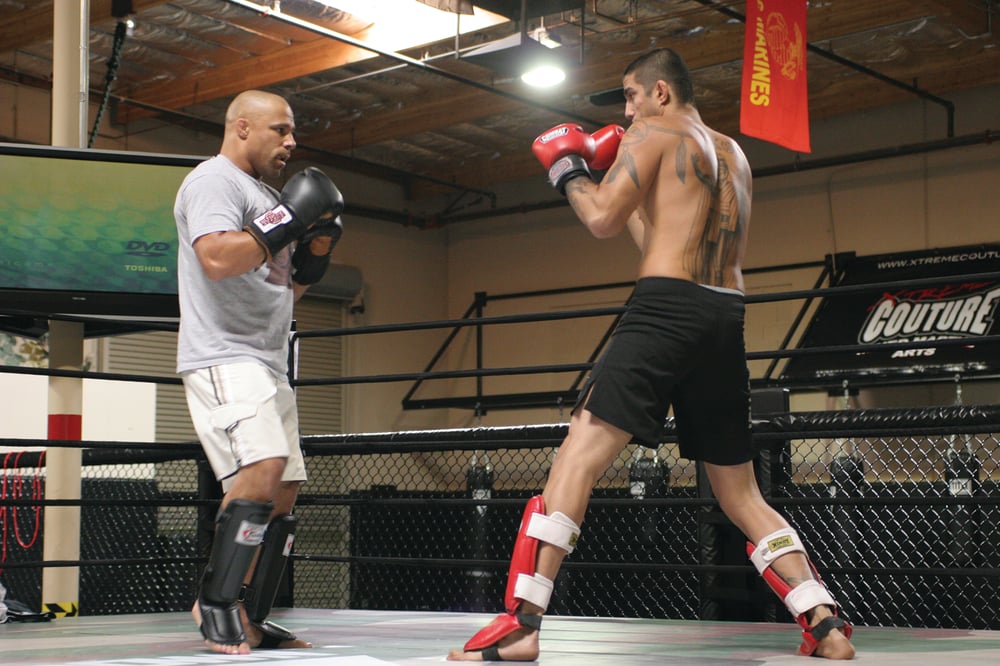
Issue 039
July 2008
For some it sounds like a nightmare, but for others it’s a dream. Stepping into the cage for a professional MMA fight is by no means easy, but dozens of fighters from all sorts of backgrounds manage to do it week in, week out. If you’ve ever thought about making the jump from Joe to pro, then this guide will give you an idea of what it really takes to be a fighter.
GETTING STARTED
“Age is an issue of mind over matter. If you don’t mind, it doesn’t matter.” Mark Twain
Think you’re too old because you’re in your mid-twenties? Some sports require extreme dedication from a very early age, but MMA attracts all sorts of people, many of them already into their adult years. Look to fighters such as the evergreen Randy Couture, who began his MMA career at age 33, for inspiration.

Unless you’ve got plenty of training under your belt, don’t even think about signing yourself up for a professional fight. The very first MMA competitions showed that unskilled ‘hard men’ who thought their street fighting prowess was enough to carry them on to victory inside the Octagon, found out hard and fast that MMA is a whole different animal. You can’t step into the cage unless you’ve put in the groundwork. First you live like a pro, then you get to be a pro – not the other way around.
Be prepared
Do you really understand what you’re getting yourself into? A professional mixed martial arts career is not something to be taken lightly. You know all those jokers you see getting into the ring giving the sport a bad name? You really, really don’t want to end up being one of them. Be prepared to work hard, to make sacrifices, to sweat, bleed and shed tears in the gym. Be prepared to wake up in the morning aching all over. Be prepared to feel more nervous than you’ve ever felt in your life. Be prepared to get hurt. This is the toughest sport in the world; don’t take it lightly.

Get a good gym (and a coach)
If you want to be a real professional, the last thing you want to be doing is training yourself. First of all you’ll need to find a good gym. Look for one that ideally offers everything under one roof (stand up, wrestling, submission grappling). Don’t be afraid to try different gyms until you find one that suits your needs. In some cases, you may not be able to find a gym that has everything you need under. Some fighters train in different gyms for different aspects of their game; the best-known example would be Georges St. Pierre, who trains Muay Thai with one gym, his wrestling with the Canadian Olympic squad and his Brazilian Jiu-Jitsu elsewhere.
Aside from finding the right gym, you’ll also need to find the right coach. Again, if things don’t feel right, then don’t be afraid to find one who works for you, but be prepared to put in plenty of work as coaches often need time before they can really start improving your game. A good Coach should be able to oversee every aspect of your development, from your fighting skills to your mental wellbeing. Cultivate your relationship with your coach – it’s among the most important you can ever hope for.

Train, train and train some more
It is better to wait and take your time in developing your skills in the gym than jump into competition before you’re ready. If you want to fight professionally after only six months of training, hold off until at least a year has passed. That way you’ll be able to look back at yourself and honestly judge what level you were at. Quite often fighters will say that if they could fight themselves from a year ago, they would kick their own ass.
Be honest with yourself
If you’ve been training a while and are performing well in the gym, then maybe it is time to start looking to book a fight. But before you do, be honest with yourself. Are you ready? Are you really good enough? Ask others the same question, and make sure you ask those who’ll give you honest answers.
FO TIP
Start off slow. You don’t have to decide if you want to be the next UFC champion right away. Work out what level you are at and go from there. It could take years or even decades, but it’s a marathon, not a sprint.

IN THE GYM
“As human beings, our greatness lies not so much in being able to remake the world – that is the myth of the atomic age – as in being able to remake ourselves.” Mahatma Ghandi
Ever heard someone say, ‘Wow, he looks like a completely different fighter!’ That didn’t happen by accident. That was the result of time and effort in the gym, something that is available to anyone with the right desire.
The gym will become your home from home. It will be a place of laughter and camaraderie but also pain and suffering. Don’t be mistaken, your hardest battles will be fought here, but these battles will be with yourself. The gym is a laboratory, not a war zone. If all you do in the gym is fight, then you’re doing it wrong. The gym is a place of hard work but also learning. You will have your battles here, but you must also take the time to practise new moves, absorb new techniques and most importantly, develop yourself.

Stick to a schedule
If you’re only going to drop into the gym here and there, forget becoming a pro right now. Just like you should turn up to work on time, your sessions in the gym are no different. If you work a ‘normal’ job, then schedule your training around your other commitments, but be prepared to schedule other stuff around your training commitments. If you blow the gym off because you’ve got something on, you’re only harming yourself. Make a schedule that works and stick to it. Consistency is key.
Set goals
If you’re thinking of fighting then training with no clear idea of what you want to do will get you nowhere, fast. Make weekly and monthly goals. You can even break these plans down into daily goals, such as ‘Today I want to work this technique in sparring’.
If you’re six weeks out from a fight, calculate how much time you have to work on the areas that need most attention and get to work. Unless you’ve got an idea of where you’re going, you’ll go nowhere.
Shelve the ego
Xtreme Couture, home to some of the world’s best fighters, has a simple motto: leave your ego at the door. It is your attitude at the beginning of a task that determines success or failure, and if you walk into the gym with a bad attitude, then you’re on your way to failing before you’ve even begun. Don’t be a dick, and reap the rewards.
FO TIP
Listen to your coaches and training partners. They’ll be able to give you honest and accurate feedback on how you’re doing.

FIT TO FIGHT
“If you don’t do what’s best for your body, you’re the one who comes up on the short end.” Julius Erving
There is no excuse for being out of shape for a fight. If you’re going to get in that cage, you had better make sure you are ready to go the full fifteen minutes if necessary. A fighter who loses by being unfit will soon get a bad reputation.
Getting on the mats is all well and good, but unless you’re fit to fight, then there is hardly any point in even considering getting in the ring. MMA is one of the most demanding sports in the world – you’ve got to be strong, fast, flexible and agile. You don’t get that way by sitting on the sofa, so get ready to get in shape.
Eat right
You cannot out-train a bad diet. Fitness comes from nutrition, exercise and recovery. If you’re not eating properly, then you’re not going to get anywhere. Eat clean if possible, and examine your diet closely. Get help in formulating a nutritional plan for your individual needs, whether it’s for bulking, cutting or general physical well-being in the off-season.

Try new things
Experiment with your fitness training. Bored of hitting the weights? Try lifting odd objects like a beer keg or a sandbag. The punch bag not giving you enough satisfaction? Take a sledgehammer to a tire instead. If you’re sick of working indoors, take some kettlebells to the park. Get creative and never get bored of working out again.
Supplements
A good diet is one thing, but rarely do hard training athletes get everything they need just from food. Look into supplementing your diet for best health. The big ones you’ll need are things like fish oil (for everything from lubricating your joints to keeping your brain healthy), Glucosamine sulphate (a proven natural anti-inflammatory and great for joint pain) and protein shakes for pre and post training or meal replacements.
Get adequate rest
Rest is just as important as exercise. People make the mistake of always going 110%, and think rest is for the weak. Rest is when your body can heal itself and grow stronger. Without rest your body will break down, and you’ll get injured, sick or burned out. Don’t feel guilty about taking time off when necessary.
FO TIP
Use music to give your workouts a boost. There is nothing like getting busy to the Rocky soundtrack.

AWAY FROM THE GYM
“The time to relax is when you don’t have time for it.” Sydney J. Harris
You can’t train all the time, so learn to enjoy the times you’re not. If you spend all your time worrying about what you’ve got to do next, you’ll miss what is happening now. Make time to do something else, whether it is spending time with family or friends or just chilling out by yourself.
Your preparation as a fighter doesn’t stop when you leave the gym. You’ll need to eat, sleep and breathe MMA to make it as a pro, but you can’t live in the gym all the time.
Find a good physio
Make friends with a physiotherapist, one you can cut a deal with and trade training for massages if possible! You’ll pick up plenty of injuries in your career, so proper care is crucial to stop minor problems becoming long-term chronic issues. Don’t overuse anti inflammatories, learn the wonders of ice and buy yourself rolls of tape (lots and lots of tape). Don’t try to train through an injury, instead train around it.
Knowledge is power
Study the art of fighting – there are a tonne of instructional videos out there from famous names covering every imaginable aspect of MMA. For example, having trouble with your takedowns? Check out a wrestling instructional and see what you can find. By adding new moves to your repertoire you’ll remain a threat to anyone, but don’t neglect the fundamentals.
Enjoy your downtime
Fighters are generally active people. Even when they’re not training, they want to stay busy. Find something away from the gym you can do that will give you a well-earned break from fighting – it could be rock climbing or playing the guitar. Everyone needs a release.
FO TIP
Love what you’re doing. Be prepared to make many sacrifices but enjoy the journey and don’t focus on the destination. If it’s no fun, then why bother doing it in the first place?










